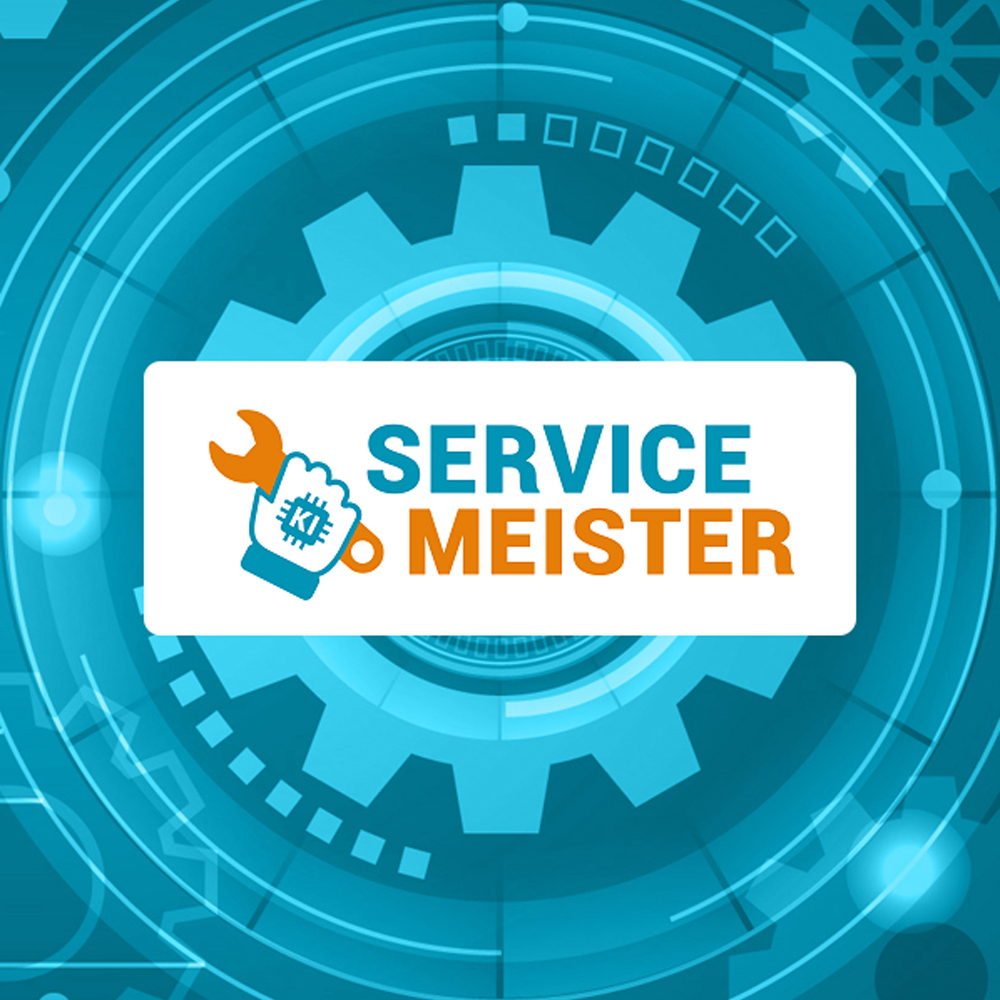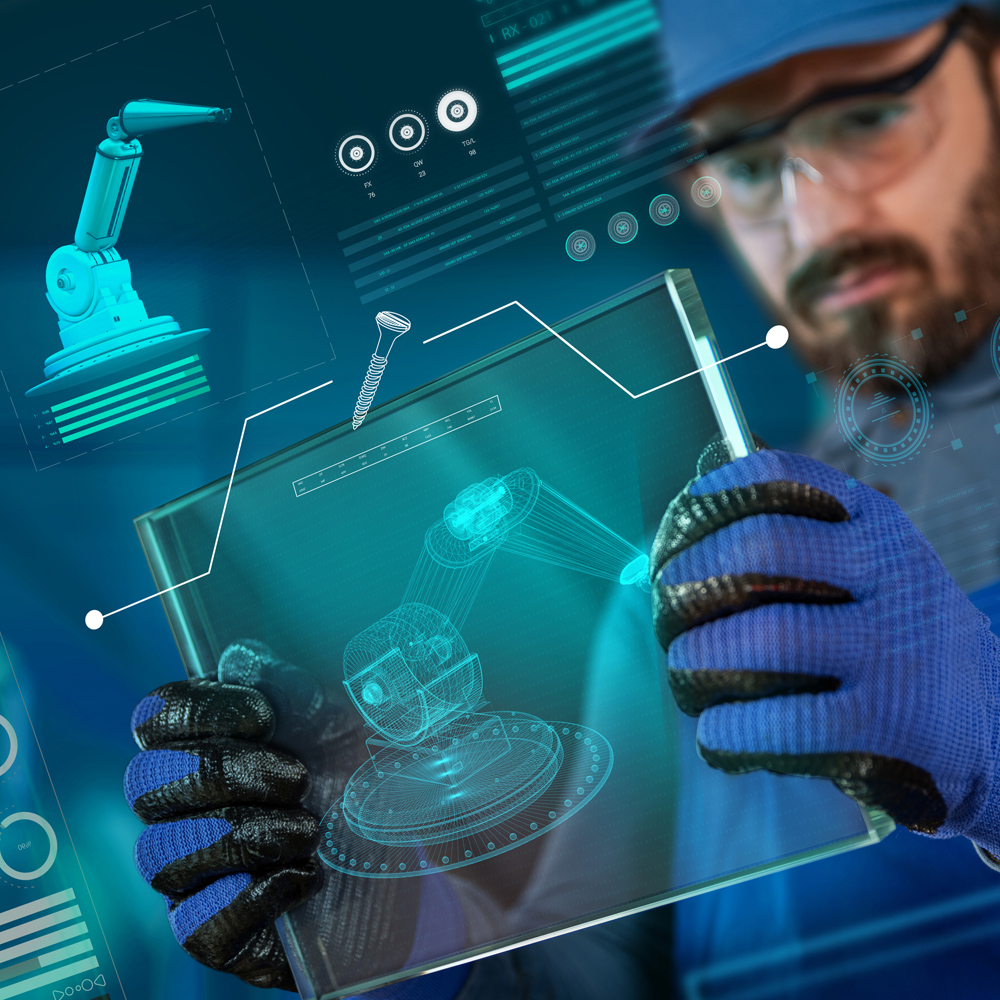
Service-Meister
The consortium sets course for the Service Economy 4.0.
With this project, we are addressing the shortage of skilled workers in technical service, the company-wide use of our own service knowledge and the marketing thereof. A catalogue of eleven generally usable AI services has emerged from the developments of the speedboat projects. The consortium’s current task is to find out how AI can now be used in small and medium-sized enterprises (SMEs).
To ensure that AI innovations are incorporated as widely as possible into operational service practice, the partners from IT and industry have come together in five speedboat projects. Whether it’s an AI chatbot, an app or an augmented reality application – in the Service-Meister consortium, the IT and software providers grandcentrix, inovex and USU are bringing smart tools to industrial service at KEB, TRUMPF, Würth, Open Grid Europe and KROHNE.
To cite an example of water management at KROHNE: “We produce and implement data-driven, intelligent systems. Via the Internet of Things (IoT), water levels and flow rates in canals and reservoirs can be monitored live and potential leaks can be detected. All of the data converge on an IoT platform in order to be visualised using AI methods – for example, errors can be predicted and the deployment planning of service teams can be optimised.”

Highlight: Service catalogue
The project has in the meantime described a total of eleven services in a generic and standardised way to show how AI tools can be integrated into typical service processes. The Service-Meister AI entry planner is already available: online, companies can evaluate the extent to which AI in service is worthwhile for them and which procedure is recommended according to the Service-Meister best practices.
Highlight: Further training
Service-Meister has created a basis for futher training on AI for entrepreneurs, technicians and trainees. This basis is an open-source curriculum to support the flow of AI knowledge more and more naturally into further training in companies. The project offers a free e-learning course on the AI Campus (in German only to date). Together with partners, a programme is being planned that will train AI professionals to educate teams in companies.
Highlight: A transfer to the SME sector and project extension
A new speedboat project is the grounds for the extension. esw GROUP develops and produces metal-plastic products for the automotive, commercial vehicle and construction industries. In order to keep machines available and plants productive, the SME, together with inovex and BHT Berlin, shortens downtimes with the help of a smart service ticket system.

Sharing data, realising economic added value – Gaia-X perspective
Keeping equipment available, reducing risks and manufacturing more flexibly: “Service-Meister also wants to develop ideas on how new business models can be created with data and AI.” TRUMPF shows what this can look like: The consortium partner has implemented a pay-per-part business model for its laser cutting systems. Without having to buy or lease machines, customers can use the fully automated systems and pay a previously agreed price per a cut sheet-metal part. What’s more: “Economic added value is created precisely when companies share their data on an industrial scale with partners, suppliers and also competitors,” said Andreas Weiss from the eco Association, adding that, “Gaia-X is enabling Europe’s data economy to take off.”
Currently, the eco Association is realising the nucleus of software that everyone who wants to work with Gaia-X needs: the Gaia-X Federation Services Project, GXFS for short. “We rely on open standards and interfaces for this,” said Vivien Witt from the GXFS project. Service-Meister is no different: “With the blueprints and reference implementations, we are already on course towards the open data economy,” said Hauke Timmermann. “We are taking the opportunity to further evaluate the opportunities of a Service Economy 4.0 using Gaia-X as an example.” There are already 70 associated partners ready and willing to collaborate.
The consortium partners
- Adolf Würth GmbH & Co. KG
- Berliner Hochschule für Technik (BHT)
- eco – Association of the Internet Industry
- Fraunhofer Institute for Software and Systems Engineering ISST
- grandcentrix GmbH
- inovex GmbH
- Institute for Internet Security – if(is)
- Karlsruhe Service Research Institute (KSRI)
- Kompetenznetzwerk Trusted Cloud e. V.
- KROHNE Messtechnik GmbH
- TRUMPF Machine Tools GmbH + Co. KG
- University of Stuttgart
- USU Software AG
